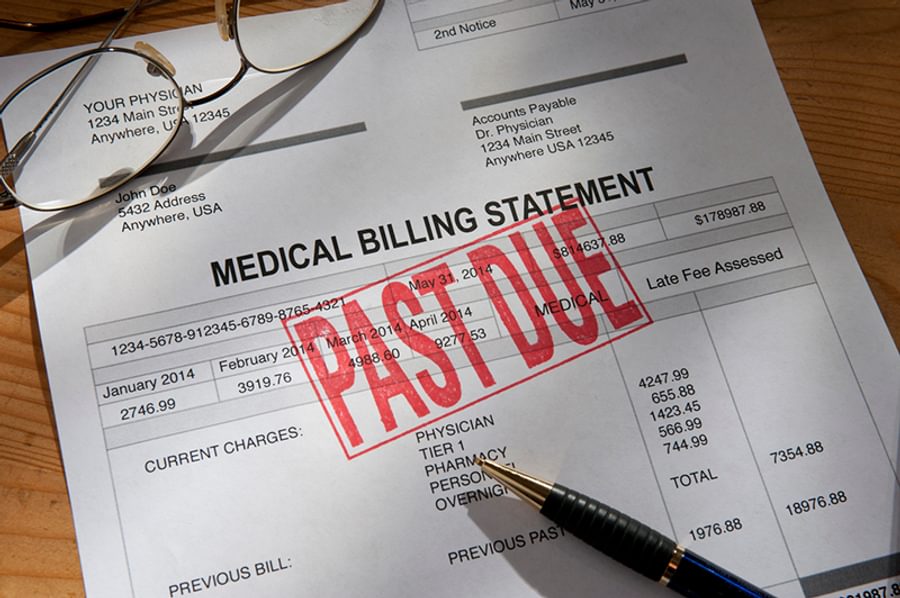Note: This information is from 2022 but much has changed since then. Please be sure to discuss your unique financial situation with your McKinley Carter Advisor or another trusted professional.

Despite over 90% of the United States population having some form of health insurance, medical debt remains a persistent problem. For people and families with limited assets, even a relatively small unexpected medical expense can be unaffordable. For people with significant medical needs, medical debt may build up over time with often no other option but making monthly payments as you can.
It can be understandably distressing trying to figure out how to pay out-of-pocket medical expenses — but it is important to understand all your options and to get financial assistance for medical bills as soon as possible. Check out these tips to help you in navigating your medical bills.
Despite over 90% of the United States population having some form of health insurance, medical debt remains a persistent problem. For people and families with limited assets, even a relatively small unexpected medical expense can be unaffordable. For people with significant medical needs, medical debt may build up over time with often no other option but making monthly payments as you can.
High deductibles and other forms of cost sharing can contribute to individuals receiving medical bills that they are unable to pay, despite being insured. People with medical debt report cutting spending on food, clothing, and other household items, spending down their savings to pay for medical bills, borrowing money from friends or family members, or taking on additional debts.
In fact, over 66% of all bankruptcies are due to medical issues in the U.S., according to CNBC. It can be tough to focus on treatment when you don’t have access to the right care or you’re trying to deal with enormous medical costs. It can be understandably distressing trying to figure out how to pay out-of-pocket medical expenses—but it is important to understand all your options and to get financial assistance for medical bills as soon as possible.
Here are some tips to help you in navigating your medical bills:
It’s possible to get financial help with medical bills and stay out of debt, even with large medical expenses. The options below can help you get rid of debt and put you on the path to financial relief.
1. Seek help through resources provided by your doctor.
- Hospitals and other medical providers, including doctors and dentists, offer payment plans to help break up your daunting medical bill into smaller installments. Typically, they offer this option either through their own system, which is often interest-free, or through an agreement with a financial institution. To learn more, call the hospital or provider’s front desk and ask to speak with someone in billing. Once connected, tell them that you’re interested in spreading out your bill payments over time, ideally without interest.
- Many institutions also offer a one-time lump sum payment discount. This means that if you agree to pay your bill in full within 30 days, you may be entitled to a one-time 10% discount off the bill total. Ask your medical provider’s office or billing department if this is an option for you.
- Lastly, many hospitals offer financial assistance to those who qualify. To determine if this is a viable option for you, they’ll request that you fill out an application and share some of your financial information, including tax returns, paystubs, and bank account balances. This may sound daunting and a little invasive, but all that paperwork might save you quite a bit of money off your final balance. Ask your hospital if they offer financial assistance and how to apply for their program.
2. High-cost prescription? Seek assistance through drug companies.
- Is your surprise medical bill related to a prescription drug that’s required for your treatment? Believe it or not, your prescribing physician usually doesn’t know how much a drug will cost you. Your doctor doesn’t know what your insurance coverage looks like or how much of your medical budget you’ve already used for the year; they simply recommended the medication they believed was best for your recovery or ongoing treatment.
- If you’re uninsured, drug companies frequently offer financial assistance for expensive prescription medications. It’s worth mentioning, though, that even if you qualify for assistance, you should follow up with your prescribing physician to ask if there’s a more affordable medication option in the long-term.
3. Don’t just pay the bill. Review all your bills for extra costs you shouldn’t pay.
- In general, it’s not uncommon for hospital bills to have errors. In fact, 80% of medical bills contain errors or overcharges. For this reason, it’s a good idea to make sure you aren’t paying for any services you didn’t receive. Some common mistakes include charging patients for a full day when they were discharged in the morning, charging patients for medications when they brought their own, and charging patients for supplies like gowns, gloves, and sheets, which should already be included in the daily room charge.
- Before paying the bill, you should request copies of your medical records from the hospital. You will want to verify dates of service, along with billing codes for all procedures and services on your hospital bill (or bills). Also, watch for duplicate billing, incorrect codes and charges for canceled procedures or services. Before setting up a payment plan with your hospital or doctor’s office, double-check all charges. You may need to contact your provider directly to clear up any incorrect charges.
4. Try negotiating before treatment.
- Under certain circumstances, say an emergency room visit, you’re not going to have much say in the cost of your treatment. But if you’re getting a planned surgery or procedure, then it’s possible to negotiate your medical bills before you undergo treatment.
- Get in touch with the hospital’s billing department to get an estimate of how much your procedure will cost.
- Present this information to your insurance provider to get an estimate of what your plan will cover.
- Once you know how much you’ll be responsible for, have a candid conversation with your hospital’s billing department to let them know how much you can afford.
- The billing department may recommend setting up a payment plan or applying for payment assistance programs, depending on your situation.
- Don’t be afraid to ask questions like, “Is this procedure necessary?” or “How much will it cost?” After all, hospital procedures are still transactional, and you are the customer. You should know if your treatment will eventually leave you thinking about medical debt consolidation.
5. Apply for government assistance programs.
- Call your state Medicare program to see if you qualify for state or federal help. https://www.usa.gov/medicare#i...
- The Children’s Health Insurance Program (CHIP) provides financial help with medical bills for low-income parents who don’t qualify for Medicaid but can’t afford private insurance coverage. https://www.usa.gov/medicaid#i...
- The Health Resources and Service Administration has several programs that offer affordable care to those struggling with medical expenses. https://www.hrsa.gov/get-healt...
6. Find charities that help pay medical bills.
- There are many resources catering to patients with specific medical conditions. Organizations such as the American Cancer Society or CancerCare, for example, help eligible families pay for cancer-related costs. Each organization has its own set of financial guidelines, and you’ll need to have a confirmed cancer diagnosis for which you’re in active treatment. You can research online or ask your social worker about any programs available for your specific medical needs.
- Another helpful organization is The Assistance Fund. The Assistance Fund is dedicated to helping individuals pay for specialty prescription medication. There are two programs: one offering financial assistance with copays and another to help pay for monthly insurance premiums. As with many of the other options we’ve mentioned above, you’ll need to meet financial criteria based on income and household size. For these particular programs, you also must be insured. You can get help from both programs at the same time if you qualify for both, as long as funds are available.
- If you’re seeking help with medical care for a young dependent, there are many organizations specifically catering to sick children. Two of the more well-known ones are St. Jude’s and Ronald McDonald House.
7. Use crowdfunding to pay for medical expenses.
- Crowdfunding has become a popular way for thousands of individuals and families to pay for expensive medical treatments when insurance coverage falls short or is nonexistent. There are many benefits of using an online fundraiser to raise money for medical bills. Here are a few:
- An online fundraiser, such as GoFundMe, can provide you with the support of your friends, family, and community during a challenging time.
- The process of setting up your fundraiser is simple and straightforward. You can begin raising money within a matter of minutes.
- It’s simple to accept donations online and get paid quickly.
- With medical fundraising, you can reduce your medical debt and make sure your expenses are covered.
Sources:
https://www.gofundme.com/c/blo...
https://www.healthsystemtracke...
https://www.usa.gov/help-with-...
https://www.reclaimhealth.com/...
